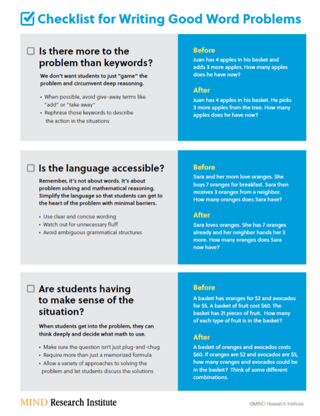
Like many people, mathematician Brandon Smith doesn't like word problems. He really doesn't like them. The problem with word problems, he says, is that they're frequently clunky, confusing and cumbersome -- and that's before even getting to the mathematics. Too often, word problems conflate problem solving with reading comprehension, making it difficult to tell whether a student is struggling with the math concepts or the words themselves.
Yet, in many cases (most notably the new career- and college-ready assessments), words are the primary way to deliver complex problems. And so we're stuck with word problems, for better or worse.
In this video, Smith asks you to think deeply about why we ask word problems in the first place, and offers actionable tips for how you can create better word problems for your students -- the kind that minimize reading comprehension and maximize problem solving.
Now that you've learned a few tips to improve word problems, download Smith's simple three-step checklist to help you craft better word problems.

Download the Checklist for Writing Good Word Problems
Also, to learn more about the shift in the kind of word problems presented on new state math assessments, see our free ebook,What Is Math Rigor? Learn a new definition of rigor and find strategies to connect classroom learning and the rigorous expectations of state standards.

Brandon Smith is the Lead Mathematician and Product Director at MIND Education, where he specializes in mathematics within ST Math and MathMINDs. Through his expertise, Brandon develops interactive learning experiences that foster a deep understanding and appreciation of mathematical concepts, utilizing a learning-by-doing approach. He is also dedicated to promoting equity in learning and development within the field of math education.
Comment